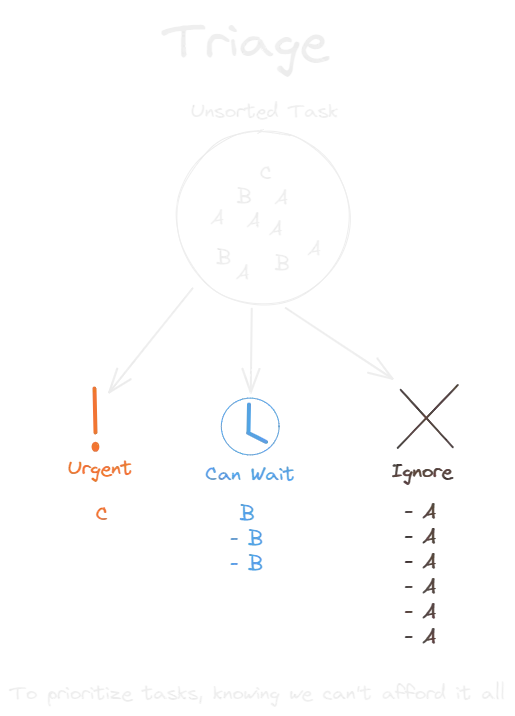Triage
Notes
Triage is a system used to allocate a scarce commodity. We know that Willpower is Limited, and so is our time and all other relevant resources we have to fulfill our goals. Therefore we have to decide what needs our immediate attention, what can wait, and what can be ignored or discarded.
There are various methods of prioritizing, that depends on the situation, available resources and our preferences, but the underlying theme is doing the right thing at the right Time.
Triaging is very hard because it forces us to say no to some things because we just can't afford dedicating time to it, like a hospital that leaves a patient waiting because other cases are more urgent. Doing what will bring the most benefit, or what's important should always be the guiding principle Pareto Principle.
While Planning can help us mitigate most of the triage needed, we have to maintain a form of Flexability because unexpected things will show up, and they might be or just seem urgent, and we need to be able to address them appropriately, whether to decide to leave everything and take care of those, or saying no despite the seeming urgency.
Many tasks might also become irrelevant if we do a proper Pre-Mortem, preparing in advance to what might fail instead of solving problems as they come up, which should be significantly easier.
And lastly, remember that you are the one who decides what counts as important and urgent, stay strong against External Influence, and decide based on what you believe it is right, and fits your Life's Mission the most.
Methods of Triage
Planning
- Energy management - Instead of trying to force certain behavior at a particular time, such as study sessions late at night, try to think how your energy distributes during the day, and which moments are best for which action. motivational scheduling
- Plan your day/week ahead of time - before you are overwhelmed by the urgent, think ahead what you want to do. Weekly Planning
- Do I really have to do it - ask yourself if it is really something you have to do, perhaps the answer might lead you to delegate it, or simply delete it Task sorting.
- What is really important - Use the Eisenhower matrix to see which tasks are important, which are urgent, which are both and which are neither.
- What has a compounding effect - which action, if done now, will save much time later on Domino Effect
Doing
- Batching - do similar tasks together Task Batching
- Just do it - if its just that short, do it immediately the 2 minute rule
Visual

Overview
🔼Topic:: workflows (Map) ◀Origin:: 🔗Link::